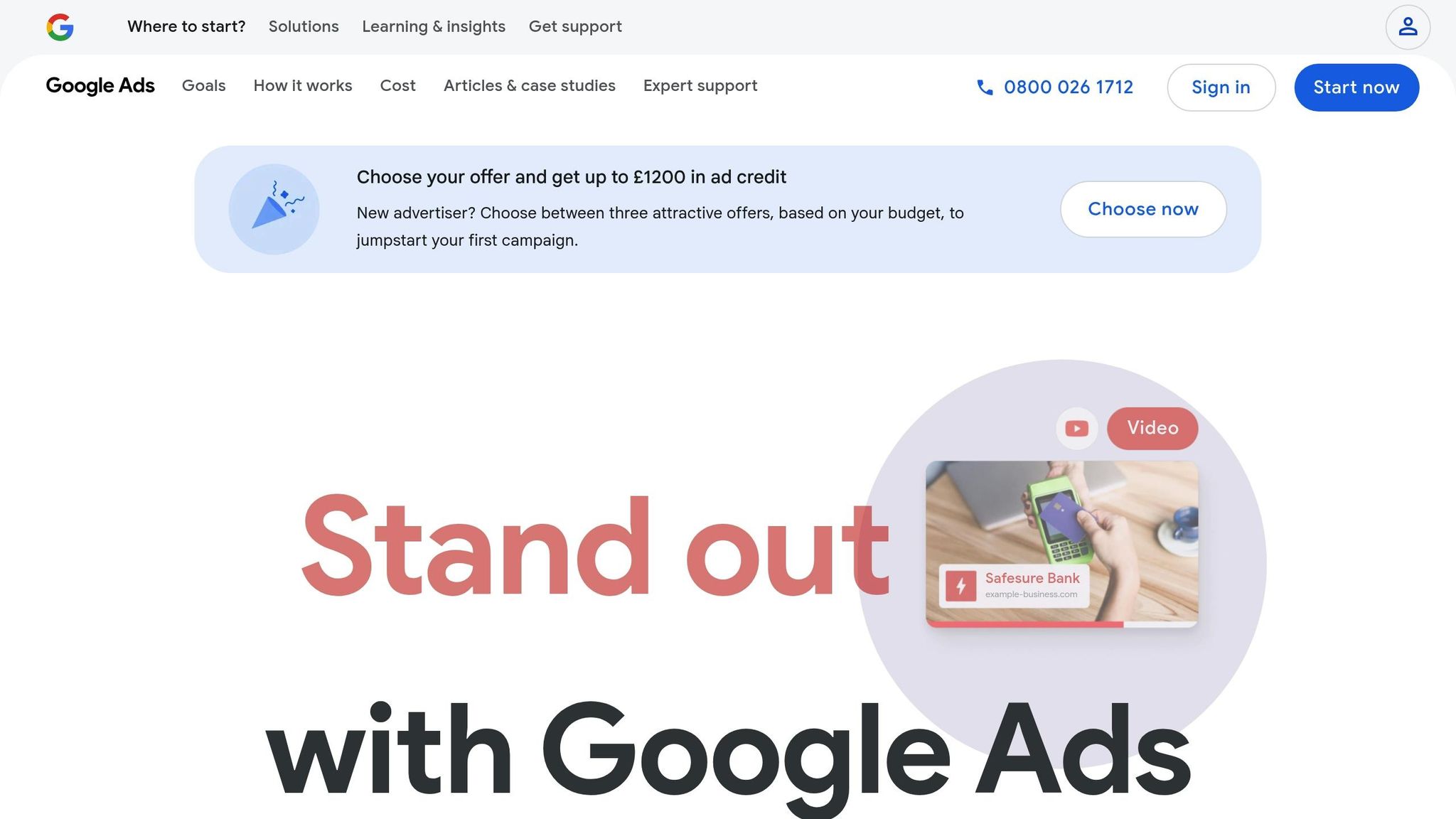Choosing a Google Ads Agency: What Actually Matters (and What Doesn’t)
When picking a Google Ads agency, focus on what drives results instead of being swayed by flashy presentations or unrealistic promises. The right agency will understand your goals, communicate clearly, and deliver measurable outcomes. Here’s what matters:
- Proven expertise: Look for certifications (e.g., Google Ads, Premier Partner status) and a track record of success.
- Case studies: Request examples showing performance improvements like increased revenue or reduced costs.
- Transparent communication: Regular, clear reporting on metrics like ROI and cost-per-lead is essential.
- Tailored strategies: Avoid one-size-fits-all approaches; ensure strategies are specific to your business needs.
Avoid common traps like getting distracted by upselling or vague guarantees. Instead, compare agencies using clear criteria, ask detailed questions about their methods, and ensure pricing and contracts are transparent. The right choice will focus on delivering value and aligning with your business goals.
5 Things Google Ads Agencies Don’t Tell You (But You Need to Know)

What Matters Most When Choosing an Agency
When you’re on the hunt for a Google Ads agency, focusing on the essentials that directly influence your campaign’s success and return on investment is key. Agencies that consistently deliver results tend to excel in four critical areas.
Proven PPC Knowledge and Skills
A strong agency demonstrates its expertise through recognised qualifications. For example, Google Ads certifications, which require an 80% pass mark and annual renewal, highlight up-to-date technical skills. Look for team members certified in areas that align with your goals – whether that’s Search, Display, Video, Shopping ads, or Apps.
Additionally, agencies that achieve Google Partner or Premier Partner status stand out. These designations reflect their performance, ad spend, and expertise. Premier Partner status, in particular, is reserved for the top 3% of companies.
"Being able to reference the Premier Partner badge gives us credibility. The badge validates that we have expert-level Google Ads product knowledge and access to special training, support, and insights – whether it’s current customers we’re helping expand their digital marketing, or a prospect." – John Adams, Strategic Partner Business Development, ChannelAdvisor
When evaluating agencies, ask about their certifications and how they stay up-to-date with platform updates. Agencies committed to continuous learning, such as through Google’s Skillshop platform, demonstrate they’re serious about maintaining expertise and keeping up with best practices. Once their credentials are clear, it’s time to dive into their track record.
Case Studies and Measurable Results
The real measure of an agency’s capabilities lies in its performance data. Request case studies that showcase tangible improvements – like a 65% increase in revenue or a 75% reduction in cost-per-lead. These numbers speak louder than any sales pitch.
Focus on examples that are relevant to your industry or specific challenges. Agencies with a proven history in similar contexts are more likely to understand your audience, competitors, and seasonal trends. This kind of evidence can give you confidence in their ability to deliver results.
Once performance is established, clear communication about ongoing progress becomes paramount.
Clear Communication and Reporting
Transparent reporting is the cornerstone of a successful partnership. Your agency should provide regular, easy-to-understand updates on campaign performance and ROI, ideally presented in £ for clarity. These reports should strike a balance – detailed enough for informed decisions but accessible to all stakeholders.
The best agencies outline their communication approach from the start. They’ll explain how often they’ll update you, which metrics they’ll track, and how they’ll report on campaign progress. A proactive agency doesn’t just highlight successes – they’ll also address challenges and offer actionable solutions. This level of transparency ensures you know exactly how your budget is being used and helps you make informed decisions.
Tailored Strategies for Your Business
Customised strategies always outperform cookie-cutter solutions. A good agency takes the time to understand your specific goals, audience, competitive landscape, and budget before crafting a plan.
You can gauge this by observing how thoroughly they research your business and the questions they ask about your products, customers, sales cycles, and past advertising efforts. Agencies that offer standard packages without digging into your unique needs are unlikely to deliver the best outcomes.
A tailored approach should align with your objectives – whether that’s boosting online sales, generating leads, or building brand awareness. The agency should also explain how they’ll adapt strategies based on your industry’s nuances and seasonal trends. They should have a clear process for testing and optimising campaigns to ensure your budget is spent effectively.
Moreover, the best agencies consider how Google Ads fits into your broader marketing strategy, ensuring their work enhances your overall efforts. This integrated approach not only maximises campaign performance but also creates a seamless customer experience.
Common Mistakes to Avoid
When evaluating potential partners, it’s crucial to focus on factors that genuinely predict campaign success, rather than being swayed by superficial promises. Missteps in this process can lead to poor choices, wasted budgets, and ineffective campaigns.
Flashy Presentations and Big Promises
While it’s tempting to be impressed by polished presentations and bold claims, these often mask the true capabilities of an agency. Many agencies put significant effort into creating visually appealing sales materials but fail to deliver quality work where it matters.
"It’s easy to be dazzled by slick presentations, trendy buzzwords, or a long list of services. But an agency’s website and sales pitch don’t necessarily reflect the quality of their work." – Conzent
Agencies that boast ‘revolutionary’ results without backing them up often lack a solid, practical strategy. Instead of being dazzled by surface-level promises, take the time to investigate the execution team. Ask for specifics – how do they manage day-to-day operations? Can they provide real-world examples of their work? How have they tackled challenges similar to yours? Focus on measurable outcomes by requesting clear examples of their strategies and the results they’ve achieved.
Extra Services and Upselling
Be cautious of agencies that try to bundle Google Ads management with other services like social media marketing, web design, or SEO. While these extras might sound appealing, they can often divert attention from your primary goals and inflate costs unnecessarily.
For example, if your main goal is to generate qualified leads through Google Ads, adding a complex social media strategy or a website redesign might not be relevant – and could even derail your campaign’s focus. Agencies that blindly follow Google’s recommendations without tailoring them to your unique needs can also waste your budget on features or campaign types that don’t align with your objectives.
To steer clear of this issue, clearly define your needs before engaging with agencies. Create a written agreement that outlines exactly what services you’re paying for. Ensure their approach is tailored to your business goals, industry, and audience. Be wary of agencies that seem more interested in upselling additional services than in understanding and addressing your immediate challenges. The best agencies prioritise achieving your core objectives first, only expanding their services when it makes strategic sense. By sticking to what’s essential, you can safeguard your budget and achieve measurable results.
sbb-itb-dcae4ad
How to Compare Agencies
Once you’ve identified the key criteria for choosing an agency, it’s time to take a structured approach to compare your options. This method ensures your decision is based on solid facts rather than relying on instinct or persuasive sales tactics.
Questions to Ask Potential Agencies
Start by evaluating whether the agency’s skills and methods align with your business needs. Begin with their experience in Google Ads, their track record, industry knowledge, and the types of campaigns they’ve managed. This will give you an idea of how well they understand your market and their ability to deliver measurable results.
Dive into their keyword research process. Ask how they assess relevance, analyse search volumes, and gauge competition. Request specific examples of campaigns they’ve handled, including the challenges they faced and the results they achieved. Avoid vague answers – ask for data-backed outcomes to see how they’ve performed in real-world scenarios.
Find out which KPIs they prioritise and how often they report on performance.
"When it comes to Pay-per-Click (PPC), honesty and transparency are key." – Sophie Fell, Head of Paid Media
Explore their optimisation strategies by asking about A/B testing, bid adjustments, and how they refine campaigns over time.
Don’t overlook practical aspects like budget management, communication style, and how they stay updated on Google Ads trends. Finally, ask them what makes their agency different – this can reveal their priorities and strengths.
These questions will help you compare agencies on a level playing field and make an informed choice.
Use a Comparison Table
A comparison table is a simple yet effective way to evaluate agencies objectively. It allows you to assess each option based on the factors that matter most to your business. Include criteria like proven expertise, case studies, pricing transparency, and communication quality.
Here’s an example of how your table might look:
| Criteria | Agency A | Agency B | Agency C |
|---|---|---|---|
| Proven Expertise | ✅ | ✅ | ⚠️ |
| Case Studies Available | ✅ | ❌ | ✅ |
| Transparent Pricing | ✅ | ✅ | ❌ |
| Industry Experience | ✅ | ⚠️ | ✅ |
| Clear Communication | ✅ | ✅ | ⚠️ |
| Account Access | ✅ | ❌ | ✅ |
You can expand this table to include other factors like reporting frequency, A/B testing methods, or specialisation in campaign types. Using symbols like ✅ (yes), ❌ (no), and ⚠️ (partial or unclear) makes it easy to spot differences at a glance. This approach ensures you focus on objective comparisons rather than being swayed by flashy presentations.
Check Pricing and Contract Terms
Agencies use different pricing models, so it’s important to understand how their fees align with your budget and goals. Here are the main pricing structures:
- Fixed fees: These provide cost predictability but may not adapt well as your business grows.
- Percentage of ad spend: This model ties agency fees to your ad performance, typically around 10% of your ad spend, though rates can vary.
- Tiered pricing: Costs increase as your ad spend reaches certain thresholds.
Most Google Ads management services start at around £300 per month, with small businesses usually spending between £1,000 and £10,000 monthly. When comparing pricing, ask detailed questions about what’s included in their fees and what might incur extra charges.
Key pricing questions to ask include:
- What are your PPC management fees, and how do they break down from click costs?
- Are there set-up fees?
- What types of ads are included in the management fee?
- Are there charges for editing or creating new ads?
Flexibility is also critical. Can you pause campaigns without penalties? Can you adjust your budget at any time? What happens if you need to reduce spending significantly? Clarify termination terms – are you locked into a long-term contract, or can you end the partnership if results don’t meet your expectations?
Ensure you’ll retain ownership of your account. Ask if you’ll have full access to your PPC account and whether you’ll retain ownership after the partnership ends. Some agencies restrict access, which can complicate things if you decide to switch providers or manage your campaigns in-house.
Lastly, confirm if additional services, like creating web pages or modifying your Google My Business account, are included in the fees or charged separately. Clear pricing and transparent terms are essential for building a trustworthy and productive partnership.
Making the Right Choice for Your Business
Once you’ve assessed agencies using solid, objective criteria, it’s time to choose a partner that aligns with your business goals.
Finding the right Google Ads agency means focusing on results rather than distractions. The agencies that truly deliver value are those that take the time to understand your business and craft tailored strategies to meet your specific needs.
Before making a decision, be clear about your objectives – whether it’s boosting sales, driving leads, or increasing brand awareness. The best agencies will not only understand these goals but also explain how their campaigns fit into your larger business strategy.
Look for agencies that showcase expertise and provide transparent reporting. The most effective ones track meaningful metrics like leads, revenue, and Cost Per Acquisition (CPA), rather than getting caught up in vanity metrics.
Review case studies that highlight real results, such as improvements in ROAS (Return on Ad Spend), CPA, and conversion rates. For context, the median conversion rate across industries is 4.61%, with a median cost per conversion of £28.46. These benchmarks can help you gauge how well an agency performs in delivering tangible outcomes.
Avoid being swayed by factors that don’t impact performance. Agency size, flashy presentations, or even geographical location are far less important than the ability to deliver strategies tailored to your goals. With global digital marketing spending predicted to hit £647 billion by 2026, it’s essential to work with an agency that can keep up with the fast-evolving digital landscape.
To test the waters, consider starting with a short pilot project or trial contract. This lets you see how well the agency understands your product and adapts to your communication style. A trial phase also helps you evaluate their responsiveness and flexibility – both crucial for navigating the rapid changes in digital advertising.
Research shows that setting SMART (Specific, Measurable, Achievable, Relevant, Time-bound) goals can improve success rates by up to 90%. Choose an agency that helps you define these types of objectives and uses a data-driven approach to achieve them. The right partner will integrate seamlessly with your team, offering clear budget discussions, regular updates, and a strong focus on driving revenue.
FAQs
How can I assess whether a Google Ads agency is experienced and trustworthy before hiring them?
To gauge the expertise and reliability of a Google Ads agency, start by examining their track record of success. Check for case studies or examples of campaigns they’ve managed, especially those relevant to your industry or objectives. A dependable agency should also openly share their certifications, like Google Ads Partner status, and be willing to provide client references if asked.
Pay close attention to how they handle communication and reporting. A reputable agency will provide transparent, detailed updates on campaign performance and clearly explain their strategies. Be cautious of agencies that rely on flashy presentations or make vague promises without offering concrete evidence. By focusing on these aspects, you can identify an agency that aligns with your business goals and delivers measurable results.
What key metrics should a Google Ads agency include in their reports to show transparency and success?
To maintain transparency and measure success, a dependable Google Ads agency should provide detailed reports featuring key metrics like cost per click (CPC), click-through rate (CTR), conversion rate, cost per acquisition (CPA), and return on ad spend (ROAS). These numbers give you a clear picture of how well your budget is being utilised.
Reports should also cover metrics such as impression share, quality score, keyword performance, and audience insights. Additionally, they should include a breakdown of your total spend and how it aligns with your campaign objectives. Regular updates presented in a straightforward manner will help ensure you feel confident about your campaign’s performance.
Why is it essential for a Google Ads agency to create tailored strategies instead of using standard packages?
Every business operates with its own set of goals, audience needs, and obstacles. That’s why having a tailored strategy is so important. When your campaigns are designed specifically for your objectives – whether that’s driving more traffic to your website, increasing sales, or building brand awareness – they become far more effective. The result? Ads that resonate better with your audience, stronger engagement, and a higher return on investment.
On top of that, a customised approach means campaigns can evolve. By analysing performance data, agencies can fine-tune elements like targeting, budgets, and messaging. This ongoing optimisation ensures your efforts stay aligned with your goals and deliver consistent results over time.


